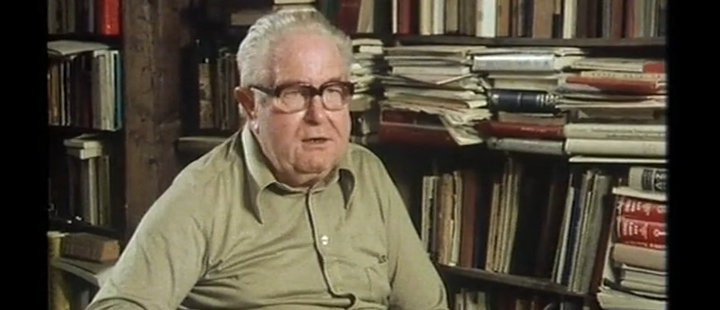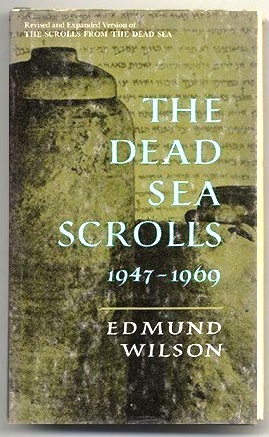In 1969 Edmund Wilson (who by then had already written 22 books), penned an eloquent portrait of David Flusser when he recounted his conversations with Flusser in his The Dead Sea Scrolls 1947-1969 (London: W. H. Allen, 1969). Here are a few excerpts from Wilson’s book:
I had met him [David Flusser] in the library of the University and asked him to come to see me, and he arrived at the King David Hotel, precipitately, abruptly, hatless, with his briefcase in his hand, and the moment we sat down in the lobby, quite without a conventional opening—since he knew that I was looking for light on the subject—he began to talk about the scrolls. He was dynamic, imaginative, passionately interested. I had heard about his absorption in ancient texts—which he seems always to carry about him—while waiting in queues for his marketing. The important thing, he said at once, was not the polemics about the dates, but what was implied by the contents of the manuscripts. He started in English but asked if he could speak French. His English was bad, he said; and few people understood Czech. (I had the impression that German was not often spoken in Israel.) Hebrew he had learned, he added, rather late in life; “My best language here is really mediaeval Latin.” I knew that he was primarily a student of mediaeval subjects, but asked him with whom he spoke Latin. “With the Jesuits,” he replied. I had been told that if you asked him a question, it would take him three hours to answer, and I could see now what people meant, but he was neither a bore nor garrulous. On the contrary, I have rarely known a scholar who expressed himself—with all his material at his fingertips—so brilliantly and so much to the point. He would give me, to each of my questions, a full and closely reasoned answer, and stop when he had covered the ground. All the texts that were needed he had brought in his briefcase, and he handed me a Greek Testament for me to follow the Pauline Epistles while he held before me the Hebrew texts and translated them fluently into Greek, demonstrating that not only the doctrine but the language itself was exactly the same….
(pp. 78-79)
Such were the pressure and tempo of Mr. Flusser’s talk that he was carried at one point to lengths that had no precedent in my experience of even the most enthusiastic talkers. Not only did he raise his voice, when some insight had taken possession of him, quite oblivious of the people sitting near us and as if he were lecturing in a classroom, but when, at the climax of one of his arguments—though we had tried to get away from the orchestra by going to the farthest corner—the music impinged on our conversation, my companion, caught up by a familiar tune, actually sang a few bars of his exposition, as if it were part of an opera; then pulled himself up and returned to prose, as he put his text back in his briefcase…. (p. 80)
Flusser is a short stocky man, with sharp little cold green eyes that glint behind round-rimmed glasses, under modestly Mephistophelian eyebrows, and red hair that stands straight up from his forehead. And he delights in deadpan humour, which, if one does not show signs at once of appreciating his ironic intent, he underlines with a harsh dry laugh. I have seen him disconcert other scholars by insisting that the errors in sacred texts and the ignorant misreadings of them were really the constructive element in the history of civilization, since the religious ideas that have had most success have mainly been founded upon them….
(p. 81)
The next day [after a meeting with Yigael Yadin in 1967 shortly before the Six Day War], I went to see David Flusser—my friend the incomparable Flusser. He is in every way except scholarly accomplishment the opposite of his colleague Yadin. He had married since I had last seen him and now held a full professorship at the Hebrew University—about both of which events he had written me in the mediaeval Latin which he had told me, on a previous visit, was then in Israel his best spoken language. Though a professor, he is completely unacademic. He is a scholar who loves scholarship for its own sake, not to secure any kind of advancement. His central interest is comparative religion, but the range of his reading is voraciously immense, and his mind is so teeming with ideas which he feels such an urgency to communicate, and one idea so irresistibly suggests another, that his conversation becomes overwhelming. One of his colleagues one said to me, “The thing about Flusser is that he flusses.” And Flusser’s Fluss may turn into a torrent. He seems to have simultaneously before him, in his mind, open texts for instant reference, both the Old Testament and the New Testaments, the Apocrypha and the Pseudepigraphs (that is, the intertestamental writings), the Talmud and other rabbinical literature and the Fathers of the Church, as well as modern Biblical scholarship and the philosophy and belles-lettres of classical and modern Europe. Though I cannot always follow his leaping and shifting thought and am often left blank by his significant quotations, which he recites or reads in the original tongues, under the impression that I can follow them, I find him fascinating to talk with about the scrolls and kindred topics because his exact memory, his comprehensive learning, and his powers of intuition have let him to make connections and to draw conclusion that nobody else has or would have thought of….
(p. 247)
He is full of humorous irony as well as of intellectual excitement, and likes to perpetrate deadpan jokes. He has grown heavier since I last saw him and is thus even more extraordinary in appearance, with his red hair, his sharp little eyes that sometimes look green, sometimes blue, and his rather large pointed ears, which have no lobes and grow directly out from his head. I was not surprised to learn that at some recent scholarly congress in India he was the only one of the delegates whose feet were kissed by the natives and who was regarded, with his genie-like appearance, as a semi-supernatural being….
(p. 251)
































































































